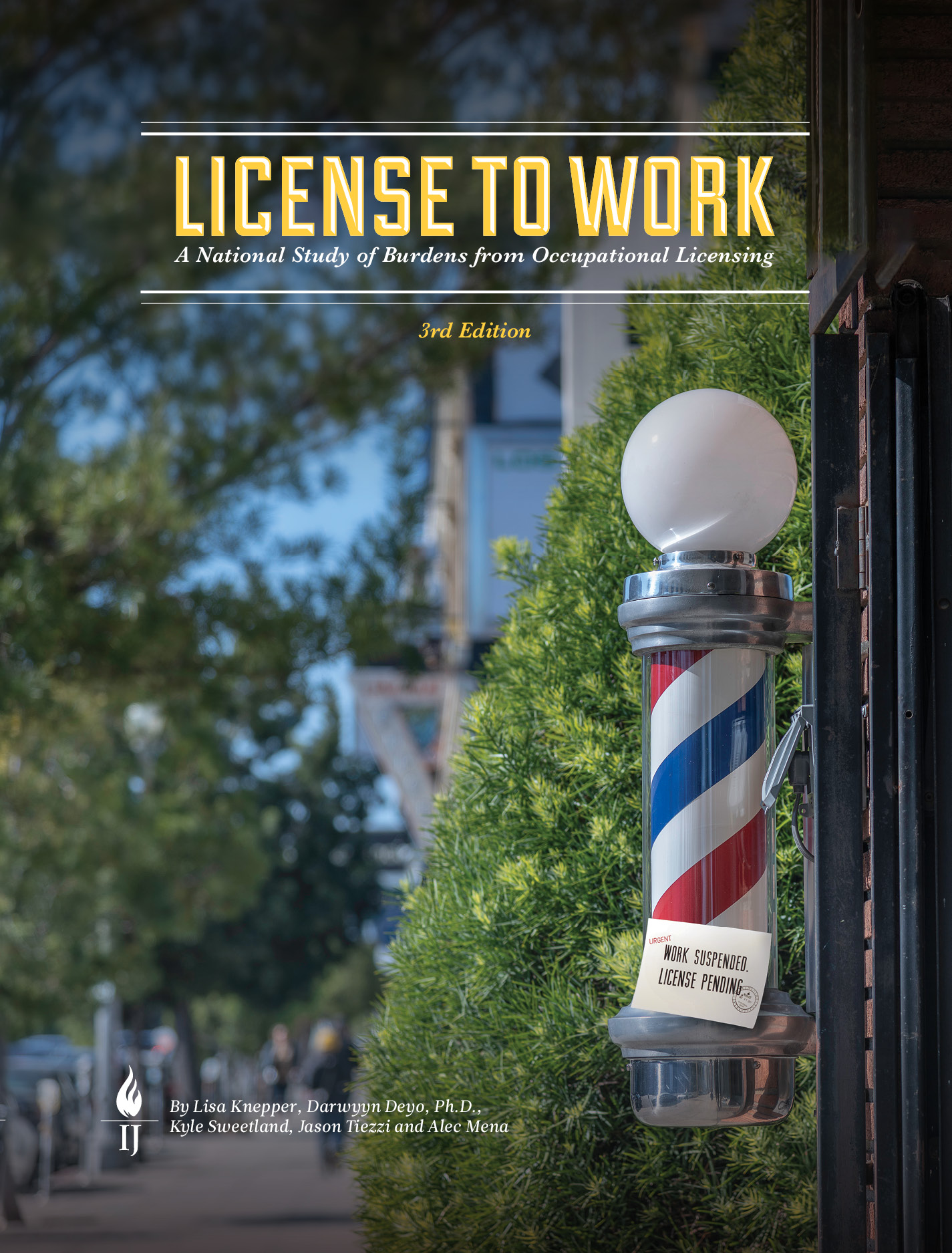Carpenter/Cabinet Maker Contractor (Commercial) Occupational Licensing
License required in 25 states
26th most burdensome licensing requirements among moderate-income occupations
Average Fee for License:$359
What They Do
Carpenter and cabinet maker contractors contract with clients to construct, erect, install or repair structures and fixtures made of wood, such as concrete forms; building frameworks, including partitions, joists, studding and rafters; and wood stairways, window and door frames, and hardwood floors. They may also install cabinets, siding, drywall, and batt or roll insulation. They include brattice builders, who build doors or brattices (ventilation walls or partitions) in underground passageways to control the proper circulation of air through the passageways and to the working places.
Typically, only contractors require licenses, not the carpenters who work for them. In some states, licensing requirements differ based on the setting. Those with a residential license may work only on residential properties, while those with a commercial license may work on commercial properties. Other states require the same license regardless of the setting, and this report records that license in both settings. Many states have contract minimums before the contractor’s license applies. See Appendix B for details.
Carpenter/Cabinet Maker Contractor (Commercial) Licensing Overview
Twenty-five states require a licence to work as a Carpenter/Cabinet Maker Contractor (Commercial). On average, these laws require $359 in fees, 429 days of education and about 1 exam. Carpenter/Cabinet Maker Contractor (Commercial) Licenses have the 26th most burdensome requirements of the 102 occupations studied. Fees for a license exceed $1000 in Nevada.
Where is a Carpenter/Cabinet Maker Contractor (Commercial) the most regulated?
Out of the 25 states that require an occupational license, an occupational license for a Carpenter/Cabinet Maker Contractor (Commercial) has the highest burden in Nevada. Nevada requires $1040 in fees, 2 exams, 4 years experience, and no education.
Where is a Carpenter/Cabinet Maker Contractor (Commercial) the least regulated?
Out of the 25 states that require an occupational license, an occupational license for a Carpenter/Cabinet Maker Contractor (Commercial) has the lowest burden in Nebraska. Nebraska requires $0 in fees, no exams, no experience, and no education.
Where is a Carpenter/Cabinet Maker Contractor (Commercial) license the most expensive?
An occupational license for a Carpenter/Cabinet Maker Contractor (Commercial) costs the most in Nevada. Nevada requires $1040 in fees, 2 exams, 4 years experience, and no education.
Where is a Carpenter/Cabinet Maker Contractor (Commercial) license the least expensive?
An occupational license for a Carpenter/Cabinet Maker Contractor (Commercial) costs the least in Nebraska. Nebraska requires $0 in fees, no exams, no experience, and no education.
Where does it take the longest to obtain a Carpenter/Cabinet Maker Contractor (Commercial) license?
An occupational license for a Carpenter/Cabinet Maker Contractor (Commercial) takes the longest to obtain in Oregon. It takes 1463 days (4 years and 3 days). Oregon requires $310 in fees, 1 exams, 4 years experience, and 16 clock hours education.
Where is it fastest to obtain a Carpenter/Cabinet Maker Contractor (Commercial) license?
An occupational license for a Carpenter/Cabinet Maker Contractor (Commercial) takes the least time to obtain in North Carolina, Rhode Island, District of Columbia, North Dakota, Tennessee, Connecticut, West Virginia, Alaska, Washington, Iowa, Idaho, Nebraska (0 days).
What states require exams for a Carpenter/Cabinet Maker Contractor (Commercial) license?
To obtain an occupational license for a Carpenter/Cabinet Maker Contractor (Commercial) there is at least one exam required in: Nevada, California, Hawaii, Arizona, Florida, Oregon, Virginia, South Carolina, Arkansas, Mississippi, Alabama, Louisiana, North Carolina, Tennessee, West Virginia. California requires 3 exams.
Twenty-five states license carpenter and cabinet maker contractors working on commercial properties. Ten states require between two and five years of experience working under a licensed contractor. Alabama and Mississippi require completion of three contracted jobs. Thirteen states require no experience. On average, states require 517 days of education and experience, $381 in fees ($1,078 in Nevada), and one exam. These high barriers give commercial carpenter contractors the 26th most burdensome requirements of the 102 occupations studied.
States Ranked by Average Licensing Burden for 102 Lower-Income Occupations
More Burdensome Less Burdensome
Based on data released in November 2022| Burden Rank | State | Occupations Licensed | Fees | Estimated Calendar Days Lost | Education | Experience | Exams | Minimum Grade | Minimum Age |
|---|---|---|---|---|---|---|---|---|---|
| 1 | Nevada | 75 | $1,040 | 1460 | None | 4 years | 2 | 0 | 18 |
| 2 | California | 75 | $579 | 1460 | None | 4 years | 3 | 0 | 18 |
| 3 | Hawaii | 64 | $694 | 1460 | None | 4 years | 2 | 0 | 18 |
| 4 | Arizona | 68 | $596 | 1460 | None | 4 years | 2 | 0 | 18 |
| 5 | Florida | 55 | $364 | 1460 | None | 4 years | 1 | 0 | 18 |
| 6 | Oregon | 69 | $310 | 1463 | 16 clock hours | 4 years | 1 | 0 | 18 |
| 7 | Virginia | 72 | $320 | 731 | 8 clock hours | 2 years | 1 | 0 | 18 |
| 8 | South Carolina | 60 | $325 | 730 | None | 2 years | 2 | 0 | 0 |
| 9 | Arkansas | 72 | $180 | 365 | None | 1 years | 1 | 0 | 0 |
| 10 | Mississippi | 65 | $640 | 67 | None | 3 jobs, contractors | 2 | 0 | 0 |
| 11 | Alabama | 63 | $492 | 67 | None | 3 jobs, contractors | 2 | 0 | 0 |
| 12 | Louisiana | 77 | $400 | 0.2 | 1 clock hours | None | 2 | 0 | 0 |
| 13 | North Carolina | 66 | $154 | 0 | None | None | 1 | 0 | 18 |
| 14 | Rhode Island | 70 | $200 | 0 | None | None | 0 | 0 | 18 |
| 15 | District of Columbia | 61 | $655 | 0 | None | None | 0 | 0 | 0 |
| 16 | North Dakota | 65 | $100 | 0 | None | None | 0 | 0 | 18 |
| 17 | Tennessee | 69 | $307 | 0 | None | None | 1 | 0 | 0 |
| 18 | Connecticut | 65 | $500 | 0 | None | None | 0 | 0 | 0 |
| 19 | Utah | 64 | $405 | 4 | 25 clock hours | None | 0 | 0 | 0 |
| 20 | West Virginia | 67 | $142 | 0 | None | None | 1 | 0 | 0 |
| 21 | Alaska | 64 | $350 | 0 | None | None | 0 | 0 | 0 |
| 22 | Washington | 76 | $118 | 0 | None | None | 0 | 0 | 0 |
| 23 | Iowa | 71 | $50 | 0 | None | None | 0 | 0 | 0 |
| 24 | Idaho | 66 | $50 | 0 | None | None | 0 | 0 | 0 |
| 25 | Nebraska | 61 | $0 | 0 | None | None | 0 | 0 | 0 |

License to Work
The data and information here come from IJ’s License to Work report, released in November 2022.
View Report

